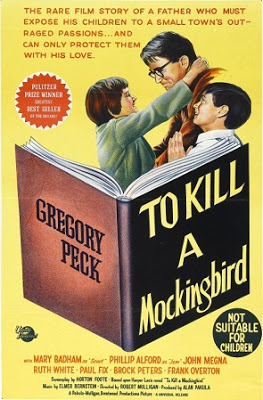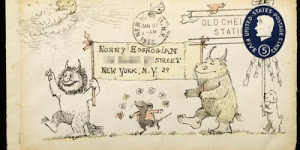 To Kill a Mockingbird, both book and film, are American icons, a snapshot of racial issues from the earlier half of the 20th century, while also being a story about growing older. A young tomboy, Scout (played by Mary Bedham), learns about doing the right thing as she watches her father (Gregory Peck) take on a racially charged case in a southern town in the 1930s. A young black man (Brock Peters) has been accursed of rape, and it is Atticus Finch who agrees to represent him. Over the course of a year and half, the case and its fall out become the backdrop of her life, even as the six year old's more innocent concerns about school, friends, and the neighborhood recluse (Robert Duvell) also unfold.
To Kill a Mockingbird, both book and film, are American icons, a snapshot of racial issues from the earlier half of the 20th century, while also being a story about growing older. A young tomboy, Scout (played by Mary Bedham), learns about doing the right thing as she watches her father (Gregory Peck) take on a racially charged case in a southern town in the 1930s. A young black man (Brock Peters) has been accursed of rape, and it is Atticus Finch who agrees to represent him. Over the course of a year and half, the case and its fall out become the backdrop of her life, even as the six year old's more innocent concerns about school, friends, and the neighborhood recluse (Robert Duvell) also unfold.
The Pulitzer Prize winning novel was published in 1960, as the American Civil Rights movement was beginning. A mere two years later, it was put to the screen, and would be nominated for Best Picture. It would go on to win Best Adapted Screenplay; Best Art Direction; and Best Actor for Gregory Peck in what some would consider his most definitive role as father Atticus Finch. The book's author, Harper Lee, later recalled, “When I learned that Gregory Peck would play Atticus Finch ... I was of course delighted: here was a fine actor who had made great films– what more could a writer ask for? … years later told me his secret. When he played Atticus Finch, he had played himself, and time has told all of us something more: when he played himself, he touched the world.” Peck also remembered the role fondly, and shared in an interview, "Hardly a day passes that I don’t think how lucky I was to be cast in that film...I recently sat at a dinner next to a woman who saw it when she was 14 years old, and she said it changed her life.” Peck was not the only one who found this a landmark film to be involved in. Brock Peters, who played Tom Robinson, the man accursed of rape, has stated, “It certainly is one of my proudest achievements in life, one of the happiest participations in film or theater I have experienced.” He remained friends with Peck and young Bedham for the rest of his life. Additionally, To Kill a Mockingbird was the film debut of Robert Duvall, William Windom, and Alice Ghostley.
But, though both the film and book are famous and each well done in their own right, they are not synonymous; the story changes as the medium does. Most notably, when Harper Lee wrote the vaguely autobiographical novel, she told the story through the very limited narration of a six year old; all is seen through her eyes. A film cannot do that and so must take on a 3rd person narrative. The Atticus a young child sees is the book is perhaps, not the whole picture; all children idolize their fathers. However, that distinction was not brought to the screen. Arguably, Peck's Atticus is too good, too perfect to be quite real within the story, no matter how much Peck is playing himself. Critic Roger Eberts takes it a step farther, stating that "[the film is] a time capsule. It expresses the liberal pieties of a more innocent time, the early 1960s, and it goes very easy on the realities of small-town Alabama in the 1930s." This is never more obvious than when a lynch mob is dispelled by a child's innocent ramblings, or the way all the colored audience members stand when Atticus walks out of the courtroom.
Still, one can argue that though the full extent of racial tensions are not seen or fairly portrayed, To Kill a Mockingbird helped to further a conversation America needed to have, and that it still furthers that conversation today. That alone makes it worth watching and remembering, a fact the the United States National Film Registry agreed with when it added the movie to the Library of Congress in 1995. So, go ahead, watch, and find out why it is a sin To Kill a Mockingbird.





I've never watched the movie! I should do that this summer :)
Reply DeleteI've seen this movie a few times and it never seems to get old. I didn't know some of these snippets of information about the film, though! Always enjoy learning a new thing or two from your posts. :)
Reply Delete